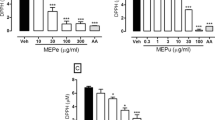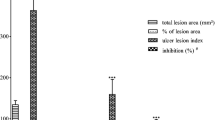Abstract
The gastroprotective potential of the methanolic extracts from peels (MEPe), seeds (MESe) and pulp (MEPu) of Chrysophyllum cainito L. (Sapotaceae) fruits was evaluated in mice using ethanol/HCl- and indomethacin-induced ulcer, as well as the antiulcer effect of the juice and flour from this fruit. The lowest oral gastroprotective dose of MEPe, MESe and MEPu against ethanol/HCl was 3, 3 and 10 mg/kg, respectively. Moreover, all extracts increased mucin secretion at 176, 198 and 193%. Intraperitoneal administration of MEPe (0.3 mg/kg), MESe (0.3 mg/kg) and MEPu (1 mg/kg) also promoted gastroprotection against ethanol/HCl. In addition, MEPe (3 mg/kg, p.o), MESe (3 mg/kg, p.o) and MEPu (10 mg/kg, p.o) reduced indomethacin-induced gastric ulcer in mice by 78, 70 and 50%, respectively. Regarding the mode of action, the gastroprotective effect of MEPe was decreased by the pre-administration of N-ethylmaleimide (NEM, a sulfhydryl group chelator, 10 mg/kg, i.p), glibenclamide (a potassium channel blocker, 10 mg/kg, i.p), yohimbine (10 mg/kg, i.p, an alpha-adrenergic receptor antagonist, 10 mg/kg, i.p) and indomethacin (a cyclooxygenase inhibitor, 10 mg/kg, i.p). The gastroprotective effect of MESe was reduced by the pre-administration of NEM, glibenclamide, N-Nitro-l-arginine methyl ester (L-NAME, a nitric oxide synthase inhibitor, 70 mg/kg, i.p) and yohimbine, while MEPu had the gastroprotective effect decreased in animals pretreated with NEM and L-NAME. However, the extracts did not reduce gastric acid secretion. The supplementation with the flour from C. cainito fruit at 10% by 7 days, but not the juice intake, displayed gastroprotective potential, evidencing the fruit as a promising functional food. Together, the antiulcer effect of extracts of the C. cainito fruit in different experimental models was confirmed by the favoring of mucosal protective mechanisms among different, but complementary, modes of action. In parallel, the gastroprotective effects of the flour from C. cainito fruit were also described.









Similar content being viewed by others
References
Alanko J, Riutta A, Holm P, Mucha I, Vapaatalo H, Metsaketela T (1999) Modulation of arachidonic acid metabolism by phenols: relation to their structure an antioxidante/pro-oxidadant properties. Free Radic Biol Med 26:193–201
Arnous A, Makris DP, Kefalas P (2001) Effect of principal polyphenolic components in relation to antioxidant characteristics of aged red wines. J Agric Food Chem 49:5736–5742
Arrieta J, Benitez J, Flores E, Castilho C, Navarrete A (2003) Purification of gastroprotective triterpenoids from stem bark of Amphipterygium adstringens; roles of prostaglandins, sulphidryls, nitric oxide and capsaicin neurons. Planta Med 69:905–909
Arvouet-Grand A, Vennat B, Pourrat A, Legret P (1994) Standardization of propolis extract and identification of principal constituents. J Pharm Belg 49:462–468
Beber AP, Souza P, Boeing T, Somensi LB, Mariano LNB, Cury BJ, Burci LM, da Silva CB, Simionatto E, de Andrade SF, da Silva LM (2017) Constituents of leaves from Bauhinia curvula Benth. Exert gastroprotective activity in rodents: role of quercitrin and kaempferol. Inflammopharmacol. https://doi.org/10.1007/s10787-017-0313-8
Bornschein J, Malfertheiner P (2014) Helicobacter pylori and gastric cancer. Dig Dis 32:249–264
Brzozowski T, Konturek PC, Drozdowicz D et al (2005) Grapefruit-seed extract attenuates ethanol-and stress-induced gastric lesions via activation of prostaglandin, nitric oxide and sensory nerve pathways. World J Gastroenterol 11:6450–6458
Candido LMB, Campos AM (2005) Alimentos funcionais. Uma revisão. Boletim da SBCTA 29:193–203
Chattopadhyay I, Bandyopadhyay U, Biswas K, Maity P, Banerjee RK (2006) Indomethacinin activates gastric peroxidase to induced reactive-oxygen-mediated gastric mucosal injuryand curcumin protects it by preventing peroxidase inactivation and scavenging reactive oxygen. Free Radical Biol Med 40:1397–1408
Coee FG, Anderson GJ (1996) Screening of medicinal plants used by the Garífuna of eastern Nicaragua for bioactive compounds. J Ethnopharmacol 26:29–50
Corne SJ, Morrissey SM, Woods RJA (1974) Method for the quantitative estimation of gastric barrier mucus. J Physiol 242:116–117
Da Silva LM, Boeing T, Somensi LB, Cury BJ, Steimbach VM, Silveria AC, Niero R, Cechinel Filho V, Santin JR, de Andrade SF (2015) Evidence of gastric ulcer healing activity of Maytenus robusta Reissek: in vitro and in vivo studies. J Ethnopharmacol 175:75–85
Dacha S, Razvi M, Massaad J, Cai Q, Wehbi M (2015) Hypergastrinemia. Gastroenterology 3:201–208
de Barros M, Mota da Silva L, Boeing T, Somensi LB, Cury BJ, de Moura Burci L, Santin JR, de Andrade SF, Monache FD, Cechinel-Filho V (2016) Pharmacological reports about gastroprotective effects of methanolic extract from leaves of Solidago chilensis (Brazilian arnica) and its components quercitrin and afzelin in rodents. Naunyn Schmiedebergs Arch Pharmacol. 389(4):403–417
Edsman K, Hägerström H (2005) Pharmaceutical applications of mucoadhesion for the non-oral routes. J Pharm Pharmacol 57:3–22
Einbond LS, Reynertson KA, Luo XD, Basile MJ, Kennelly EJ (2004) Anthocyanin antioxidant from edible fruits. Food Chem 84:23–28
Eom CS, Lee SS (2011) Risk of fracture and pneumonia from acid suppressive drugs. World J Methodol 1:15–21
Fülöp K, Zádori Z, Rónai AZ, Gyires K (2005) Characterization of α2-adrenoceptor subtypes involved in gastric emptying, gastric motility and gastric mucosal defense. Eur J Pharmacol 528:150–157
Gyires K, Toth VE, Zadori ZS (2015) Gastric mucosal protection: from the periphery to the central nervous system. J Physiol Pharmacol 66:319–329
Hellou J, Ross NW, Moon TW (2012) Glutathione, glutathione S-transferase and glutathione conjugates, complementary markers ofoxidative stress in aquatic biota. Environ Sci Pollut Res 19:2007–2023
Kallaya E, Suthiluk P, Naruemon V, Duangporn T (2006) Effects of Aloe vera and sucralfate on gastric microcirculatory changes, cytokine levels and gastric ulcer healing in rats. World J Gastroenterol 7:2034–2039
Lapa AJ, Souccar C, Lima-Landman MTR, Castro MAS, Lima TCM (2008) Methods of evaluation of pharmacological activity of medicinal plants. Campinas: Brazilian Society of Medicinal Plants – SBPM, UNIFESP-SP, 7–43
Leme J Jr, Malavolta E (1950) Photometric determination of ascorbic acid. Ann Coll Agric Luiz Queiroz 7:115–129
Li LF, Chan RL, Lu L, Shen J, Zhang L, Wu WK, Wang L, Hu T, Li MX, Cho CH (2014) Cigarette smoking and gastrointestinal diseases: the causal relationship and underlying molecular mechanisms (review). Int J Mol Med 34:372–380
Lu H, Graham DY (2006) New development in the mechanistic understanding of peptic ulcer diseases. Drug Discov Today Dis Mech 3:431–437
Luo XD, Basile MJ, Kennelly EJ (2002) Polyphenolic antioxidants from the fruits of Chrysophyllum cainito L. (Star Apple). J Agric Food Chem 50:1379–1382
Mao LM, Qi XW, Hao JH, Liu HF, Xu QH, Bu PL (2015) In vitro, ex vivo and in vivo anti-hypertensive activity of Chrysophyllum cainito L. extract. Int J Clin Exp Med 8:17912–17921
Matsuda H, Li Y, Yoshikawa M (1999) Roles of capsaicin-sensitive sensory nerves, endogenous nitric oxide, sulphydryls, and prostaglandins in gastroprotection by mormodin Ic, na oleanolic acid oligoglycoside, on ethanol-induced gastric mucosal lesion in rats. Life Sci 65:27–32
Medeiros JV, Gadelha GG, Lima SJ, Garcia JA, Soares PM, Santos AA, Brito GA, Ribeiro RA, Souza MH (2008) Role of the NO/cGMP/K(ATP) pathway in the protective effects of sildenafil against ethanol-induced gastric damage in rats. Br J Pharmacol 153:721–772
Meira NA, Klein LC Jr, Rocha LW, Quintal ZM, Monache FD, Cechinel Filho V, Quintão NL (2014) Anti-inflammatory and anti-hypersensitive effects of the crude extract, fractions and triterpenes obtained from Chrysophyllum cainito leaves in mice. J Ethnopharmacol 151:975–983
Mizui T, Doteuchi M (1983) Effect of polyamines on acidified ethanol-induced gastric lesion in rats. Jpn J Pharmacol 33:939–945
Moo-Huchin VM, Moo-Huchin MI, Estrada-Leon RJ, Cuevas-Glory L, Estrada-Mota IA, Ortiz-Vazquez E, Betancur-Ancona D, Sauri-Duch E (2015) Antioxidant compounds, antioxidant activity and phenolic content in peel from three tropical fruits from Yucatan, Mexico. Food Chem 166:17–22
Mowry R, Winkler CH (1956) The coloration of acidic carbo hydrates of bacteria and fungi in tissue sections with special reference to capsules of Cryptococcus neoformans, Pneumococci and Staphilococci. Am J Pathol 32:628–639
Nguessan K, Amoikon KE, Tiébré MS, Kadja B, Zirihi GN (2009) Effect of aqueous extract of Chrysophyllum cainito leaves on the glycaemia of diabetic rabbits. Afr J Pharm Pharmacol 3:501–506
Parker IM, López I, Petersen JJ, Anaya N, Cubilla-Rios L, Potter D (2010) Domestication syndrome in Caimito (Chrysophyllum cainito L.): fruit and seed characteristic. Econ Bot 64:161–175
Peskar BM, Ehrlich K, Peskar BA (2002) Role of ATP-sensitive potassium channels in prostaglandin-mediated gastroprotection in the rat. J Pharmacol Exp Ther 301:969–974
Pino J, Marbot R, Rosado A (2002) Volatile constituents of star apple (Chrysophyllum cainito L.) from Cuba. Flavour Fragr J. 17:401–403
Rainsford KD (1980) Biochemical gastroprotection from acute ulceration induced by aspirin and related drugs. Biochem Pharmacol 29:1281–1289
Repetto MG, Llesuy SF (2002) Antioxidant properties of natural compounds used in popular medicine for gastric ulcers. Braz J Med Biol Res 35:523–534
Ricciotti E, FitzGerald GA (2011) Prostaglandins and Inflammation. Arterioscler Thromb Vasc Biol 31:986–1000
Robert A, Nezamis JE, Lancaster C, Hanchar A (1979) Cytoprotection by prostaglandins in rats: prevention of gastric necrosis produced by alcohol, HCl, NaOH, hypertonic NaCl, and thermal injury. Gastroenterology 77:433–443
Rozza AL, Cesar DAS, Pieroni LG, Saldanha LL, Dokkedal AL, de Faria AFM, Souza-Brito ARM, Vilegas W, Takahira RK, Pellizzon CH (2015) Anti-ulcerogenic activity and toxicity of Bauhinia holophylla hydroalcoholic extract. Evidence-Based Complement Altern Med 2015:439506
Shay H, Komarov SA, Fels SS, Marenze D, Grunstein M, Siplet H (1945) A simple method for the uniform production of gastric ulceration in the rat. Gastroenterology 5:43–61
Sheen E, Triadafilopoulos G (2011) Adverse effects of long-term proton pump inhibitor therapy. Dig Dis Sci 56:931–950
Spencer GL, Meade GP (1945) Special Reagentes. Cane Sugar Handbook, New York
Tarnawski AS (2005) Cellular and molecular mechanisms of gastrointestinal ulcer healing. Dig Dis Sci 50:24–33
Thomson AB, Sauve MD, Kassam N, Kamitakahara H (2010) Safety of the long-term use of proton pump inhibitors. World J Gastroenterol 16:2323–2330
Wedemeyer RS, Blume H (2014) Pharmacokinetic drug interaction profiles of proton pump inhibitors: an update. Drug Saf 37:201–211
Yokotani K, Okuma Y, Nakamura K, Osumi Y (1993) Release of endogenous acetylcholine from a vascularly perfused rat stomach in vitro; inhibition by M3 muscarinic autoceptors ans alpha-2 adrenoceptors. J Pharmacol Exp Ther 266:1190–1195
Acknowledgment
We thank the National Council for Scientific and Technological Development (CNPq), Coordination for the Improvement of Higher Education Personnel (CAPES), Foundation for Support to Scientific and Technological Research of the State of Santa Catarina (FAPESC) and University of Vale do Itajaí (UNIVALI) Financial support.
Author information
Authors and Affiliations
Corresponding author
Ethics declarations
Conflict of interest
The authors declare that they have no conflicts of interest.
Rights and permissions
About this article
Cite this article
da Rosa, R.L., de Almeida, C.L., Somensi, L.B. et al. Chrysophyllum cainito (apple-star): a fruit with gastroprotective activity in experimental ulcer models. Inflammopharmacol 27, 985–996 (2019). https://doi.org/10.1007/s10787-017-0427-z
Received:
Accepted:
Published:
Issue Date:
DOI: https://doi.org/10.1007/s10787-017-0427-z




